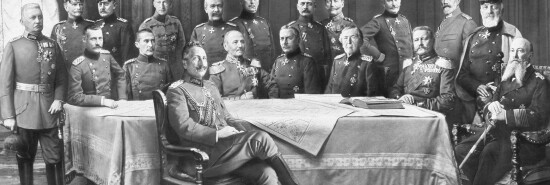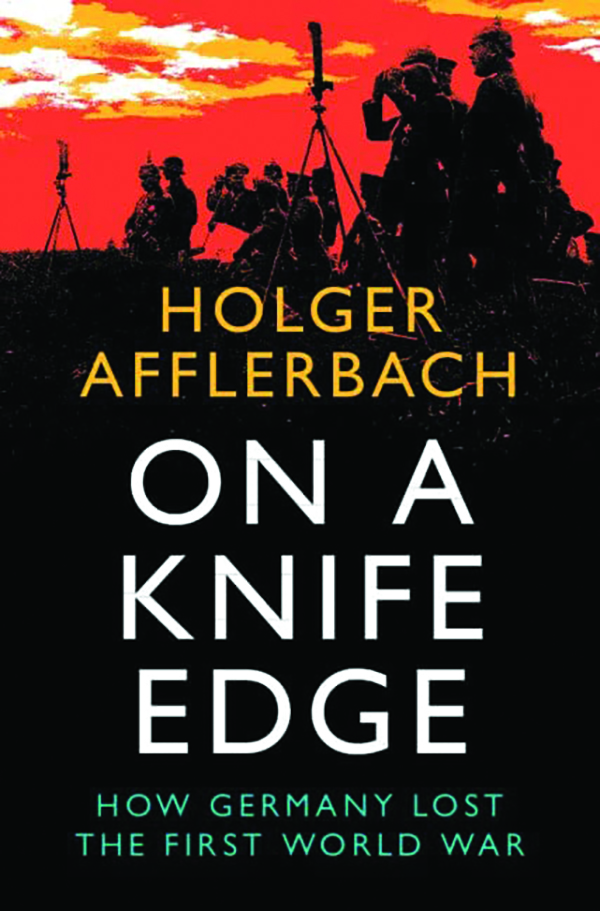
Was WWI inevitable?
Avi Woolf
In his magisterial history of the Peloponnesian Wars, the late classicist Donald Kagan sought to counter the popular conception of Thucydides’ history of that period, per which the clash between the Athenian and Spartan empires was simply inevitable, practically a law of physics extrapolated to the human realm — history and foreign policy scholars call the supposed law that rising powers eventually come into conflict with existing ones a “Thucydides trap.” Throughout the four-volume work, Kagan points to moments when the people in charge on all sides could have reasonably made different choices, which may very well have led to very different historical outcomes.
Leeds University professor and WWI historian Holger Afflerbach wishes to do something similar in On a Knife Edge, in which he seeks to counter the idea that the outbreak of WWI was somehow the inevitable result of imperial competition or German desire for world domination. The great powers of Europe, he argues, weren’t trapped into the Great War. They walked into it. They could have avoided it.

Marshaling a wide range of recent scholarship, Afflerbach argues that Germany constantly felt as though it was close to winning and also close to losing — hence “on a knife edge” — but that it was a series of contingent and specific mistaken decisions taken by its leadership that doomed the country not only to lose the war but also suffer moral opprobrium thereafter. The result is a highly readable account not only of the German side of the war but to some extent a retrospective on the war as a whole, one both enthusiasts and specialists can enjoy and fruitfully debate.
Afflerbach’s core argument is that Germany did not act in a unified, integrated manner when it came to its policy before or during the war. Instead, the different power centers — different parts of the army, the chancellor and Cabinet, the kaiser, the right-wing and left-wing parties in the Reichstag, and also indirectly German public opinion — struggled to gain control of the country’s direction in terms of its tactics and ultimate strategy. The result was what Afflerbach calls “polycratic chaos” rather than unitary, consistent direction from the people in charge.
This problem was visible already in the run-up to the war and its first months. The political leadership, especially the kaiser and German Chancellor Bethmann Hollweg, failed to consider how the army’s Schlieffen Plan, which would have the Germans invade neutral Belgium in order to subdue the French more quickly, would bring a unified Britain into the war, making possible victory a lot harder.
The same is true for the infamous “blank check” Germany gave to its ally Austria-Hungary in 1914 to punish Serbia for the assassination of heir apparent Franz Ferdinand (which was supported by Serbian army intelligence). No one on the German side made any effort to learn what their ally had in mind, even though it might force a general war. Until the very last moment, they deluded themselves that Austria-Hungary would be satisfied with something short of all-out war with Serbia, which would mean war with its ally Russia and its ally France, rather than try and prevent the catastrophe.
When Germany finally joined the war, the German public and its leaders veered wildly between pessimism and optimism. One minute, they thought that they would inevitably lose against the Entente that so outnumbered them in manpower and resources. The next minute, they were convinced that some great tactical achievement would lead to a decisive victory. The September Program, a sweeping program of annexation in both Western and Eastern Europe drafted when it seemed Germany might win outright, is a good example of the latter. These wild swings would endure until the end of the war.
In the first two years or so, Germany managed to avoid losing the war, even if it didn’t win it. Despite anger at companies in neutral America supplying the Entente with war materiel, the chancellor and others managed to back down from an all-out submarine campaign to sink U.S. ships. That plan would have not only failed, but also likely forced Washington to enter the war two years earlier than it did.
Germany also managed to hold back any offensive that came close to breaking it or its allies. Whether it was driving back the Russians from conquering Austria-Hungary, aiding the Ottoman Empire in blocking the effort to take Istanbul, or blocking large-scale offensives on the Western Front, things seemed to be stable.
The wheels started coming off in 1916, though. A tightening British blockade choked off vital food and other supplies to the country and its citizenry. Massive, bloody Entente offensives at the Somme and in Galicia, combined with the failure of the German army to break through at Verdun, rattled and deeply disheartened everyone.
It was in this state of German despair and desperation that two almost twinned phenomena emerged: serious efforts to try and broker a peace between the warring sides and German efforts to win the war outright through various and increasingly desperate means. Here we find the core of Afflerbach’s argument for the contingent nature of WWI.
Afflerbach spends a lot of time discussing the efforts to secure peace through talks, trying to argue that there may have been a way out, that the German offer to join mediation was sincere in most cases, and that the catastrophe of a Soviet Russia and millions more dead could have been avoided. Unfortunately, I find him less than convincing. Peace may indeed have saved Europe from worse than it already suffered. But by Afflerbach’s own admission, there was no firm leadership capable of or interested in telling and convincing the German people and its leaders that it would have to give up all the foreign territory it occupied, despite the severe cost in German blood in taking it. In Germany itself, for example among factions in the Reichstag, as well as in dealing with others among the Central Powers, being ambiguous about Germany’s war aims was good for keeping internal political peace between those who wanted annexation and those who wanted a lot less. But it was fatal for gaining any serious interest among the Entente.
When Germany fatally decided to try to win the war at all costs, it was through the decision to launch unrestricted submarine warfare against Britain to cut it off from American and other shipping, even if that meant killing Americans on board and forcing them into the war. The German leadership simply assumed that the U.S. could not raise an army large and powerful enough to send overseas rather than seriously investigate the possibility — just as with the blank check. A combination of incredible hubris and desperation led to one of the biggest own goals in German history, forcing a president who literally won on a slogan of “He Kept Us Out of the War” to involve America in the largest armed conflict in its history since its Civil War.
Most of Afflerbach’s arguments for “it could have gone the other way” rest on focused tactical analysis of specific battles and campaigns, and especially on the desperate 1918 German offensive on the Western Front. At this lower level, they fail to convince because Afflerbach himself notes that at no point during the war on this front did the Germans decide on some actual goal or target that would have put them in a position to sue for peace credibly.
At the higher level, there’s a more convincing case that there were moments when things could have turned out differently, but for some particular decision that would have pushed the war off of the proverbial knife’s edge. The choice to force America into the war, like the Schlieffen Plan drawing Britain into the war, is instructive. Here, a reasonable case can be made that Germany’s impatience for victory or at least a draw led to its complete defeat. Afflerbach’s second look at whether World War I was not inevitable is not as successful as his predecessor Donald Kagan’s look at classical history. But he does succeed at the highest level in making us realize that the disaster of WWI was ultimately determined by human decision-making, not some great and immutable law of nature.
Avi Woolf is an editor and translator. He has been published in Arc Digital, National Review, the Bulwark, and Commentary.
